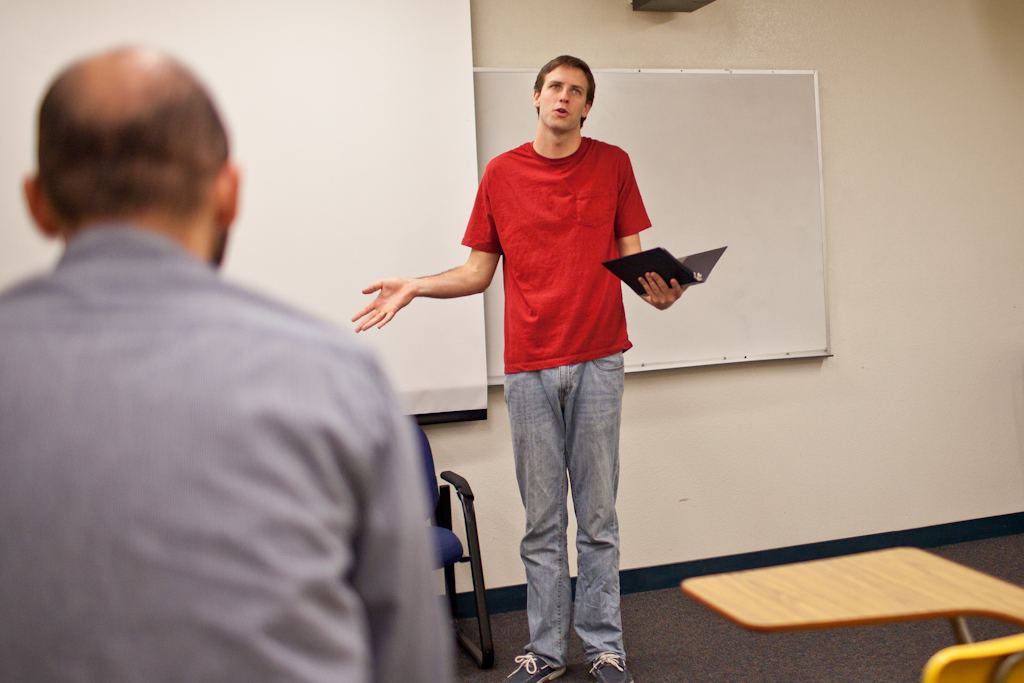
Nick Shorts practices a story during speech and debate club at their weekly meeting. | Ashley Jones/THE CHIMES
The Biola forensics team placed fifth out of 23 four-year universities at California Double-Up. The three-day event that took place Oct. 14-16 was hosted by Concordia University, Azusa Pacific University and Irvine Valley College. The Double-Up is an event that took place in Irvine at Concordia University as well as Irvine Valley with two tournaments on the same weekend. One tournament took place on Friday and Saturday, and the second tournament followed on Sunday.
The competitions included Lincoln-Douglas debate, parliamentary debate, impromptu, after-dinner speaking and dramatic duo.
Daniel Elliot, assistant professor of communication studies and director of forensics, leads the team along with the speech coaches, adjunct faculty members: Jonathan Burrello, Lorina Schrauger and debate coach Tim Milosch. The team has been preparing since the last weekend in August. Forensics has about six speakers and 10 debaters on the team, and all of them competed in at least one event.
“We have been representing the school with local tournaments and national tournaments,” Milosch said.
He believes the forensics team gives a recognizable contribution to putting Biola’s name out into the world.
It is an excellent oppurtunity for the team to step out of the Biola bubble and interact with non-believers from secular universities, Schrauger explained.
Students place high in California Double-Up
“Each team member contributes to the final score of the competition,” said Nick Shorts, senior forensics team captain. The team has a talent that he wishes Biola students could see, he said.
Shorts and junior Leah Freeman together placed third and first place in open duo on two seperate days for this category. Junior Cameron Gardiner took sixth place in open impromptu. Junior Courtney Gammariello and senior Chantelle Gibbs took third in open duo. In addition to the winnings, sophomores Sean Hansen and Hilary Boerger were quarterfinalists.
Junior Scott Alford won three of four rounds giving him a winning record to advance. He placed in octofinals in the Lincoln-Douglas debate and octofinals a second time with senior Corey VanHuystee, in the parliamentary debate. Alford received the bronze medal for the Lincoln-Douglas debate in the open division.
Students debate against some of most prestigious universities
Alford explained some of his competitors were against some of the most prestigious universities in both Lincoln-Douglas and parliamentary debates. Some of those universities included Concordia, APU, Western Kentucky University, University of Utah and Point Loma Nazarene University.
The Forensic team had some losses, but Alford expressed how he felt otherwise. “We also had our share of wins as well,” Alford said.
Alford and Shorts expressed the team is humble about what they have accomplished but they expect to practice more for upcoming years.
“We plan to improve our speeches and cases,” Shorts said.
Different styles of debate
There are two different forms of debate — the Lincoln-Douglas and parliamentary debate. Parliamentary debate has two competitors against another two competitors. With parliamentary debate, from the time the team is notified, they have 20 minutes to come up with an argument, Milosch said.
There are three different categories in speech debates: platform, interpretive and limited preparation, Schrauger said. Platform events are where you write out a speech about a topic. An Interpretive event is when the participant will take a piece of literature and act it out for a period of time. Limited preparation is the third type of speech category in where the competitor is given a topic and has a very limited amount of time to prepare.
Team prepares through practice rounds and assignments
There are different ways they prepare for each debate, Milosch said. For the Lincoln-Douglas policy debate, they research, study and gather evidence. For the parliamentary debate, the team has practice rounds and every week the debate team will have a research assignment, Milosch said.
There is a lot of preparation during the summer and the first part of fall, Schrauger explained. They read a lot of books, brainstorm topics and make sure the topics are cutting edge.
Elliot explained that they do not create plans to beat specific teams. He further stated they work on producing excellent speeches and well informed debaters.
“The better we do as individuals, the more successful we will be as a team and the more likely we will receive more points to beat some of these larger teams,” Elliot said.







